
TRYDONIS 88/5/9 microgramas pó para inalação
Pergunte a um médico sobre a prescrição de TRYDONIS 88/5/9 microgramas pó para inalação

Como usar TRYDONIS 88/5/9 microgramas pó para inalação
Introdução
Prospecto: informação para o utilizador
Trydonis 88microgramas/5microgramas/9microgramas pó para inalação
dipropionato de beclometasona/fumarato de formoterol dihidrato/glicopirronio
Leia todo o prospecto atentamente antes de começar a usar este medicamento, porque contém informações importantes para si.
- Conserva este prospecto, porque pode ter que o reler.
- Se tiver alguma dúvida, consulte o seu médico ou farmacêutico.
- Este medicamento foi prescrito apenas para si, e não deve dá-lo a outras pessoas, mesmo que tenham os mesmos sintomas que si, porque pode prejudicá-las.
- Se experimentar efeitos adversos, consulte o seu médico ou farmacêutico, mesmo que se trate de efeitos adversos que não aparecem neste prospecto. Ver secção 4.
Conteúdo do prospecto
- O que é Trydonis e para que é utilizado
- O que necessita saber antes de começar a usar Trydonis
- Como usar Trydonis
- Posíveis efeitos adversos
- Conservação de Trydonis
- Conteúdo do envase e informações adicionais
1. O que é Trydonis e para que é utilizado
Trydonis é um medicamento para ajudar a respirar que contém três princípios ativos:
- dipropionato de beclometasona,
- fumarato de formoterol dihidrato e
- glicopirronio.
O dipropionato de beclometasona pertence a um grupo de medicamentos chamados corticosteroides, que atuam reduzindo a inflamação e a irritação nos pulmões.
O formoterol e o glicopirronio são medicamentos chamados broncodilatadores de ação prolongada. Atuam de formas diferentes para relaxar os músculos das vias respiratórias, ajudando a alargá-las e permitindo-lhe respirar mais facilmente.
O tratamento regular com estes três princípios ativos ajuda a aliviar e prevenir sintomas como a dificuldade para respirar, as sibilâncias e a tos nos pacientes adultos com doença pulmonar obstructiva crónica (DPOC). Trydonis pode reduzir as exacerbações (piorias) dos sintomas da DPOC. A DPOC é uma doença grave de evolução longa na qual as vias respiratórias se bloqueiam e os sacos aéreos do interior dos pulmões se danificam, provocando dificuldade para respirar.
2. O que necessita saber antes de começar a usar Trydonis
Não use Trydonis
Se é alérgico ao dipropionato de beclometasona, ao fumarato de formoterol dihidrato e/ou ao glicopirronio ou a algum dos outros componentes deste medicamento (incluídos na secção 6).
Advertências e precauções
Trydonis é utilizado como tratamento de manutenção da doença pulmonar obstructiva. Não utilize este medicamento para tratar uma crise súbita de dificuldade para respirar ou sibilâncias.
Se a sua respiração piorar
Se logo após inalar o medicamento apresentar uma pioria da dificuldade para respirar ou das sibilâncias (respirações com um som silbante), interrompa o tratamento com o inhalador de Trydonis e utilize em seguida o seu inhalador “de resgate” de ação rápida. Deve contactar o seu médico imediatamente. O seu médico avaliará os seus sintomas e, se necessário, pode que o mude o tratamento.
Ver também a secção 4. Posíveis efeitos adversos.
Se a doença pulmonar piorar
Se os seus sintomas piorarem ou forem difíceis de controlar (p. ex., se está utilizando outro inhalador “de resgate” com maior frequência) ou se o seu inhalador “de resgate” não melhora os seus sintomas, acuda ao seu médico imediatamente. É possível que a doença pulmonar esteja piorando e o seu médico tenha que prescrever-lhe um tratamento diferente.
Consulte o seu médico ou farmacêutico antes de começar a usar Trydonis:
- se tiver algum problema do coração, como angina de peito (dor cardíaca, dor no peito), um ataque cardíaco recente (infarto do miocárdio), insuficiência cardíaca, um estreitamento das artérias do coração (doença coronária), uma doença das válvulas cardíacas ou qualquer outra anomalia do coração, ou se tiver uma doença chamada miocardiopatia hipertrófica obstructiva (também conhecida como MHO, uma doença na qual o músculo do coração é anormal).
- se tiver distúrbios do ritmo cardíaco, como uma frequência cardíaca irregular, uma frequência de pulso rápida ou palpitações ou se lhe disseram que o seu eletrocardiograma (ECG) é anormal.
- se tiver um estreitamento das artérias (também conhecido como arteriosclerose), se tiver a pressão arterial alta ou se tiver um aneurisma (um abaulamento anormal da parede de um vaso sanguíneo).
- se tiver uma glândula tiróide hiperativa.
- se tiver níveis baixos de potássio no sangue (hipopotasemia). A combinação de Trydonis com certos medicamentos também para o pulmão ou medicamentos tais como os diuréticos (medicamentos que fazem com que o organismo perca água, para tratar uma doença cardíaca ou a pressão arterial alta) pode causar um marcado descenso dos níveis de potássio no sangue. Por isso, é possível que o seu médico deseje medir os seus níveis de potássio no sangue de vez em quando.
- se padece alguma doença do fígado ou dos rins.
- se tiver diabetes. As doses altas de formoterol podem aumentar a glicose no sangue, por isso é possível que sejam necessários alguns exames de sangue adicionais para determinar os seus níveis de açúcar no sangue quando começar a usar este medicamento e de vez em quando durante o tratamento.
- se tiver um tumor da glândula suprarrenal (conhecido como feocromocitoma).
- se lhe vai ser administrado um anestésico. Dependendo do tipo de anestésico, pode ser necessário interromper o tratamento com Trydonis pelo menos 12 horas antes da anestesia.
- se está a receber ou recebeu alguma vez tratamento para a tuberculose (TB) ou se tiver uma infecção no peito.
- se tiver um problema ocular chamado glaucoma de ângulo estreito.
- se tiver dificuldades para urinar.
- se tiver uma infecção na boca ou na garganta.
Se se encontrar em alguma das circunstâncias acima, informe o seu médico antes de começar a usar Trydonis.
Se tiver ou tiver tido algum problema de saúde ou alergia ou se tiver dúvidas sobre se pode usar Trydonis, consulte o seu médico ou farmacêutico antes de começar a usar o inhalador.
Se já está a utilizar Trydonis
Se está a utilizar Trydonis ou doses altas de outros corticosteroides inhalados durante períodos de tempo prolongados e se produz uma situação de stresse (p. ex., se o levaram ao hospital após um acidente, tem uma ferida grave ou antes de uma operação), é possível que necessite mais medicamento. Nesses casos, pode que o seu médico tenha que aumentar-lhe a dose de corticosteroides para fazer face ao stresse e pode que os prescreva em forma de comprimidos ou injeções.
Entre em contacto com o seu médico se apresentar visão borrosa ou outras alterações visuais.
Crianças e adolescentes
Não administre este medicamento a crianças e adolescentes menores de 18 anos.
Outros medicamentos e Trydonis
Informa o seu médico ou farmacêutico se está a tomar, tomou recentemente ou pode ter que tomar qualquer outro medicamento. Isso inclui os medicamentos semelhantes a Trydonis utilizados para a sua doença pulmonar.
Alguns medicamentos podem aumentar os efeitos de Trydonis, por isso o seu médico fará controles minuciosos se está a tomar estes medicamentos (incluídos alguns para o VIH: ritonavir, cobicistat).
Não utilize este medicamento com um medicamento betabloqueante(utilizado para tratar certos problemas de coração, tais como angina de peito ou para reduzir a pressão arterial) a menos que o seu médico tenha escolhido um betabloqueante que não afete a sua respiração. Os betabloqueantes (incluídos os betabloqueantes em colírio) podem reduzir os efeitos do formoterol ou fazê-los desaparecer por completo. Por outro lado, o uso de outros medicamentos beta2 agonistas (que atuam do mesmo modo que o formoterol) pode aumentar os efeitos do formoterol.
O uso conjunto de Trydonis com:
- medicamentos para tratar
- ritmos cardíacos anómalos (quinidina, disopiramida, procainamida),
- reações alérgicas (antihistamínicos),
- os sintomas da depressão ou os distúrbios mentais como os inibidores da monoamino oxidase (p. ex., fenelzina e isocarboxazida), antidepresivos tricíclicos (p. ex., amitriptilina e imipramina) e fenotiazinas pode causar alguns cambios no eletrocardiograma (ECG, traçado cardíaco). Também podem aumentar o risco de alterações do ritmo cardíaco (arritmias ventriculares).
- medicamentos para tratar a doença de Parkinson (levodopa), medicamentos para tratar uma glândula tiróide hipoativa (levotiroxina), medicamentos que contêm oxitocina (que causa contrações uterinas) e o álcool pode aumentar as possibilidades de que se produzam efeitos adversos do formoterol sobre o coração.
- inibidores da monoamino oxidase (IMAO), incluídos medicamentos com propriedades semelhantes como a furazolidona e a procarbazina, utilizados para tratar distúrbios mentais, pode causar um aumento da pressão arterial.
- medicamentos para tratar as doenças cardíacas (digoxina) pode causar um descenso dos níveis de potássio no sangue. Isso pode aumentar a probabilidade de que se produzam ritmos cardíacos anómalos.
- outros medicamentos utilizados para tratar a doença pulmonar obstructiva (teofilina, aminofilina ou corticosteroides) e diuréticos também pode causar uma queda dos níveis de potássio.
- alguns anestésicos podem aumentar o risco de que se produzam ritmos cardíacos anómalos.
Gravidez e lactação
Se está grávida ou em período de lactação, acredita que possa estar grávida ou tem intenção de engravidar, consulte o seu médico ou farmacêutico antes de utilizar este medicamento.
Só deve usar Trydonis durante a gravidez se o seu médico o aconselhar. É preferível evitar o uso de Trydonis durante o parto devido aos efeitos inibitórios do formoterol sobre as contrações uterinas.
Não deve usar Trydonis durante a lactação. O senhor e o seu médico devem decidir se é necessário interromper a lactação ou interromper o tratamento após considerar o benefício da lactação para o seu filho e o benefício do tratamento para si.
Condução e uso de máquinas
É improvável que Trydonis afete a sua capacidade para conduzir e utilizar máquinas.
Trydonis contém lactose
A lactose contém pequenas quantidades de proteínas do leite, as quais podem provocar reações alérgicas.
3. Como usar Trydonis
Siga exatamente as instruções de administração deste medicamento indicadas pelo seu médico ou farmacêutico. Em caso de dúvida, consulte novamente o seu médico ou farmacêutico.
A dose recomendada é duas inalações pela manhã e duas inalações à noite.
Se acredita que o medicamento não está a resultar muito eficaz, consulte o seu médico.
Se já estava a utilizar outro inhalador que continha dipropionato de beclometasona anteriormente, consulte o seu médico, pois a dose eficaz de dipropionato de beclometasona de Trydonis para o tratamento da doença pulmonar obstructiva pode ser inferior à de outros inhaladores.
Via de administração
Trydonis é para uso por via inhalatória.
Deve inalar o medicamento através da boca, o que leva o medicamento diretamente aos pulmões.
Instruções de uso
Para consultar a informação sobre o conteúdo do envase, ver secção 6.
Se o conteúdo do envase não coincidir com o descrito na secção6, devolva o inhalador à pessoa que lho forneceu e obtenha um novo.
- Nãoretire o inhalador da bolsa se não tiver intenção de o usar imediatamente.
- Use sempre o inhalador da forma indicada.
- Mantenha a tampa fechada até que necessite tomar uma dose do inhalador.
- Quando não estiver a usar o inhalador, conserve-o em um local limpo e seco.
- Nãotente desmontar o inhalador sob qualquer circunstância.
- Características essenciais do inhalador




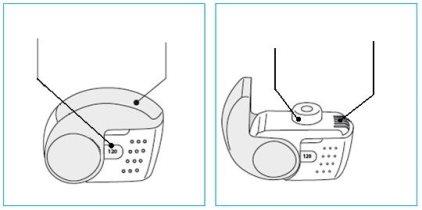
Tomar uma dose do inhalador envolve três passos: abrir, inalar, fechar.
- Antes de usar um inhalador novo
- Abra a bolsa e retire o inhalador.
- Nãouse o inhalador se a bolsa não estiver fechada ou apresentar algum dano; devolva-o ao farmacêutico que lho forneceu e obtenha um novo.
- Use a etiqueta da caixa para anotar a data em que abriu a bolsa.
- Inspeccione o inhalador.
- Se o inhalador parecer estar partido ou danificado, devolva-o ao farmacêutico que lho forneceu e obtenha um novo.
- Verifique a janela do contador de doses. Se o inhalador for novo, verá “120” na janela do contador de doses.
- Nãouse o inhalador novo se o número indicado for menor que “120”; devolva-o ao farmacêutico que lho forneceu e obtenha um novo.
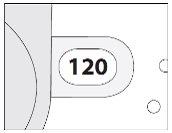
- Como usar o inhalador
C.1. Abrir
- Sostenha o inhalador firmemente em posição vertical.
- Verifique o número de doses restantes: qualquer número entre “1” e “120” indica que há doses restantes.
- Se a janela do contador de doses mostrar “0”, não resta nenhuma dose; elimine o inhalador e obtenha um novo.
- Abra completamente a tampa.
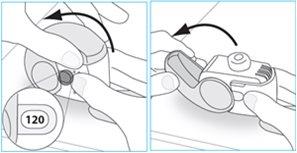
- Antes de inalar, expire de forma tão prolongada quanto lhe for confortável.
- Nãoexpire através do inhalador.
C.2.Inalar
Sempre que forpossível,ponha-se de pé ou sente-se em posição erguida para realizar a inalação.
- Levante o inhalador, leve-o à boca e ponha os lábios ao redor do aplicador bucal.
- Nãocubra o respirador ao segurar o inhalador.
- Nãoinale através do respirador.
- Realize uma inspiração forte e profunda pela boca.
- Pode notar um certo sabor ao tomar a dose.
- Pode ouvir ou sentir um estalo ao tomar a dose.
- Nãoinale através do nariz.
- Nãoretire o inhalador dos lábios durante a inalação.
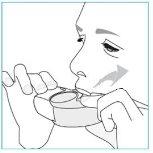
- Retire o inhalador da boca.
- Aguente a respiração durante 5 a 10 segundos ou durante tanto tempo quanto lhe for confortável.
- Expire lentamente.
- Nãoexpire através do inhalador.
- Se não tiver certeza de estar a receber a sua dose corretamente, entre em contacto com o seu farmacêutico ou médico.
C.3. Fechar
- Coloque o inhalador de novo em posição vertical e feche completamente a tampa.
- Verifique se o contador de doses baixou uma unidade.
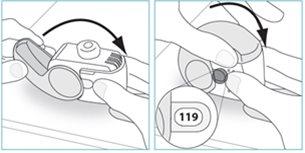
- Se não tiver certeza de que o contador de doses baixou uma unidade após uma inalação, espere até a próxima dose programada e tome-a normalmente. Não tome uma dose adicional.
- Se precisar tomar outra dose, repita os passos C.1 a C.3.
- Limpeza
- Normalmente, não é necessário limpar o inhalador.
- Se necessário, pode limpar o inhalador após o uso com um pano ou lenço de papel seco.
- Nãolimpe o inhalador com água ou outros líquidos. Mantenha-o seco.
Se usar mais Trydonis do que deve
É importante que tome a dose tal como lhe foi indicada pelo seu médico. Não supere a dose prescrita sem consultar antes o seu médico.
Se usar mais Trydonis do que deve, podem aparecer os efeitos adversos descritos na secção 4.
Informa o seu médico se usou mais Trydonis do que deve e se experimenta algum destes sintomas. É possível que o seu médico queira realizar-lhe alguns exames de sangue.
Se esquecer de usar Trydonis
Use-o assim que se lembrar. Se for quase a hora da próxima dose, não se administre a dose que omitiu, mas apenas a dose seguinte à hora correcta. Não duplique a dose.
Se interromper o tratamento com Trydonis
É importante usar Trydonis todos os dias. Não interrompa o tratamento com Trydonis nem diminua a dose, mesmo que se sinta melhor ou não tenha sintomas. Se quiser fazer isso, consulte o seu médico.
Se tiver alguma outra dúvida sobre o uso deste medicamento, pergunte ao seu médico ou farmacêutico.
4. Possíveis efeitos adversos
Tal como todos os medicamentos, este medicamento pode produzir efeitos adversos, embora nem todas as pessoas os sofram.
Existe um risco de agravamento da dificuldade para respirar e das sibilâncias imediatamente após o uso de Trydonis, o que se conhece como broncoespasmo paradoxal (pode afetar até 1 em cada 1.000 pessoas). Se isso ocorrer, deve interromper o tratamento com Trydonis e usar sem demora o seu inhalador "de resgate" de ação rápida para tratar a dificuldade para respirar e as sibilâncias. Deve entrar em contato com o seu médico imediatamente.
Informar ao seu médico imediatamente
- se experimentar reações alérgicas como alergias cutâneas, erupções cutâneas, picos na pele, erupção cutânea (pode afetar até 1 em cada 100 pessoas), rubor da pele, inchaço da pele ou das membranas mucosas, especialmente dos olhos, da face, dos lábios e da garganta (pode afetar até 1 em cada 1.000 pessoas).
- se experimentar dor ou desconforto nos olhos, visão turva transitória, halos visuais ou imagens coloridas associadas a olhos vermelhos. Estes podem ser sinais de uma crise aguda de glaucoma de ângulo estreito (podem afetar até 1 em cada 10.000 pessoas).
Informar ao seu médico se notar algum dos seguintes sintomas durante o uso de Trydonis, pois podem ser devidos a uma infecção pulmonar (pode afetar até 1 em cada 10 pessoas):
- febre ou calafrios
- aumento da produção de muco, mudança na cor do muco
- aumento da tosse ou da dificuldade para respirar
Os possíveis efeitos adversossão listados a seguir de acordo com a sua frequência.
Frequentes(podem afetar até 1 em cada 10 pessoas)
- dor de garganta
- secreção ou congestão nasal e espirros
- infecções por fungos da boca. Enxaguar a boca ou fazer gárgaras com água e escovar os dentes imediatamente após a inalação pode ajudar a prevenir estes efeitos adversos
- rouquidão
- dor de cabeça
- infecção do trato urinário
Pouco frequentes(podem afetar até 1 em cada 100 pessoas)
|
|
Raros(podem afetar até 1 em cada 1.000 pessoas)
|
|
Muito raros(podem afetar até 1 em cada 10.000 pessoas)
- nível baixo do número de certas células do sangue chamadas plaquetas
- sensação de sufocamento ou de dificuldade para respirar
- inchaço das mãos e dos pés
- atraso do crescimento em crianças e adolescentes
Frequência não conhecida(não pode ser estimada a partir dos dados disponíveis)
- visão turva
O uso de corticosteroides inhalados em doses altas durante um período de tempo prolongado pode causar, em casos muito raros, efeitos no organismo:
- problemas no funcionamento das glândulas suprarrenais (supressão adrenal)
- diminuição da densidade mineral óssea (adelgaçamento dos ossos)
- embaçamento da lente ocular (catarata)
Trydonis não contém um corticosteroide inhalado em doses altas, mas é possível que o seu médico deseje medir os seus níveis de cortisol no sangue de vez em quando.
Os seguintes efeitos adversos também podem ocorrer quando se utilizam corticosteroides inhalados em doses altas durante um período de tempo prolongado, mas atualmente a sua frequência não é conhecida (não pode ser estimada a partir dos dados disponíveis):
- depressão
- sensação de preocupação, nervosismo, sobre-excitação ou irritabilidade
Estes efeitos são mais prováveis em crianças.
Comunicação de efeitos adversos
Se experimentar qualquer tipo de efeito adverso, consulte o seu médico ou farmacêutico, mesmo que se trate de possíveis efeitos adversos que não aparecem neste prospecto. Também pode comunicá-los diretamente através do Sistema Europeu de Farmacovigilância de Medicamentos de Uso Humano: https://www.notificaram.es. Mediante a comunicação de efeitos adversos, você pode contribuir para fornecer mais informações sobre a segurança deste medicamento.
5. Conservação de Trydonis
Mantenha este medicamento fora da vista e do alcance das crianças.
Não utilize este medicamento após a data de validade que aparece na etiqueta e na caixa após CAD/EXP. A data de validade é o último dia do mês que se indica.
Não conserve a uma temperatura superior a 25 °C.
Conserve o inhalador no embalagem original para protegê-lo da umidade e só o retire da bolsa imediatamente antes do primeiro uso.
Após a primeira abertura da bolsa, o medicamento deve ser utilizado em um prazo de 6 semanas e conservado em um local seco. Use a etiqueta adesiva da caixa exterior para anotar a data em que abriu a bolsa e cole esta etiqueta na parte inferior do inhalador.
Os medicamentos não devem ser jogados nos desagües nem na lixeira. Pergunte ao seu farmacêutico como se livrar dos envases e dos medicamentos que já não precisa. Desta forma, ajudará a proteger o meio ambiente.
6. Conteúdo do envase e informações adicionais
Composição de Trydonis
Os princípios ativos são: dipropionato de beclometasona, fumarato de formoterol diidratado e glicopirronio.
Cada dose liberada (a dose que sai do aplicador bucal) contém 88 microgramas de dipropionato de beclometasona, 5 microgramas de fumarato de formoterol diidratado e 9 microgramas de glicopirronio (na forma de 11 microgramas de brometo de glicopirronio).
Cada dose medida contém 100 microgramas de dipropionato de beclometasona, 6 microgramas de fumarato de formoterol diidratado e 10 microgramas de glicopirronio (na forma de 12,5 microgramas de brometo de glicopirronio).
Os demais componentes são: lactose monoidratada (ver seção 2) e estearato de magnésio.
Aspecto do produto e conteúdo do envase
Trydonis é um pó para inalação de cor branca a quase branca.
É fornecido em um inhalador de plástico branco chamado NEXThaler com uma cobertura para o aplicador bucal de cor cinza e um contador para as inalações.
Cada inhalador está embalado em uma bolsa protetora fechada.
Trydonis está disponível em envases que contêm um inhalador e em envases múltiplos que contêm dois ou três inhaladores, os quais fornecem 120 inalações cada um (120, 240 ou 360 inalações).
Pode ser que apenas alguns tamanhos de envases estejam comercializados.
Titular da autorização de comercialização
Chiesi Farmaceutici S.p.A.
Via Palermo 26/A
43122 Parma
Itália
Responsável pela fabricação
Chiesi Farmaceutici S.p.A.
Via San Leonardo 96
43122 Parma
Itália
Chiesi SAS
2 rue des Docteurs Alberto et Paolo Chiesi
41260 La Chaussée Saint Victor
França
Podem solicitar mais informações sobre este medicamento dirigindo-se ao representante local do titular da autorização de comercialização:
Bélgica Chiesi sa/nv Tel: + 32 (0)2 788 42 00 | Lituânia Chiesi Pharmaceuticals GmbH Tel: + 43 1 4073919 |
| Luxemburgo Chiesi sa/nv Tel: + 32 (0)2 788 42 00 |
República Tcheca Chiesi CZ s.r.o. Tel: + 420 261221745 | Hungria Chiesi Hungary Kft. Tel: + 36-1-429 1060 |
Dinamarca Chiesi Pharma AB Tel: + 46 8 753 35 20 | Malta Chiesi Farmaceutici S.p.A. Tel: + 39 0521 2791 |
Alemanha Chiesi GmbH Tel: + 49 40 89724-0 | Países Baixos Chiesi Pharmaceuticals B.V. Tel: + 31 88 501 64 00 |
Estônia Chiesi Pharmaceuticals GmbH Tel: + 43 1 4073919 | Noruega Chiesi Pharma AB Tel: + 46 8 753 35 20 |
Grécia Chiesi Hellas AEBE Tel: + 30 210 6179763 | Áustria Chiesi Pharmaceuticals GmbH Tel: + 43 1 4073919 |
Espanha Laboratorios BIAL, S.A. Tel: + 34 91 562 41 96 | Polônia Chiesi Poland Sp. z.o.o. Tel: + 48 22 620 1421 |
França Chiesi S.A.S. Tel: + 33 1 47688899 | Portugal Chiesi Farmaceutici S.p.A. Tel: + 39 0521 2791 |
Croácia Chiesi Pharmaceuticals GmbH Tel: + 43 1 4073919 | Romênia Chiesi Romania S.R.L. Tel: + 40 212023642 |
Irlanda Chiesi Farmaceutici S.p.A. Tel: + 39 0521 2791 | Eslovênia CHIESI SLOVENIJA, d.o.o. Tel: + 386-1-43 00 901 |
Islândia Chiesi Pharma AB Tel: +46 8 753 35 20 | Eslováquia Chiesi Slovakia s.r.o. Tel: + 421 259300060 |
Itália Chiesi Italia S.p.A. Tel: + 39 0521 2791 | Finlândia Chiesi Pharma AB Tel: +46 8 753 35 20 |
Chipre Chiesi Farmaceutici S.p.A. Tel: + 39 0521 2791 | Suécia Chiesi Pharma AB Tel: +46 8 753 35 20 |
Letônia Chiesi Pharmaceuticals GmbH Tel: + 43 1 4073919 |
Data da última revisão deste prospecto: Dezembro 2024
Outras fontes de informação
A informação detalhada deste medicamento está disponível na página web da Agência Europeia de Medicamentos: http://www.ema.europa.eu.

Quanto custa o TRYDONIS 88/5/9 microgramas pó para inalação em Espanha em 2025?
O preço médio do TRYDONIS 88/5/9 microgramas pó para inalação em dezembro de 2025 é de cerca de 74.35 EUR. Os valores podem variar consoante a região, a farmácia e a necessidade de receita. Confirme sempre com uma farmácia local ou fonte online para obter informações atualizadas.
- País de registo
- Preço médio em farmácia74.35 EUR
- Substância ativa
- Requer receita médicaSim
- Fabricante
- Esta informação é apenas para referência e não constitui aconselhamento médico. Consulte sempre um médico antes de tomar qualquer medicamento. A Oladoctor não se responsabiliza por decisões médicas baseadas neste conteúdo.
- Alternativas a TRYDONIS 88/5/9 microgramas pó para inalaçãoForma farmacêutica: INALAÇÃO PULMONAR, 172 microgramas/5 microgramas/9 microgramasSubstância ativa: formoterol, glycopyrronium bromide and beclometasoneFabricante: Chiesi Farmaceutici S.P.A.Requer receita médicaForma farmacêutica: INALAÇÃO PULMONAR, 87/5/9 microgramas/ativaçãoSubstância ativa: formoterol, glycopyrronium bromide and beclometasoneFabricante: Chiesi Farmaceutici S.P.A.Requer receita médicaForma farmacêutica: INALAÇÃO PULMONAR, 88 microgramas/ 5 microgramas/ 9 microgramasSubstância ativa: formoterol, glycopyrronium bromide and beclometasoneFabricante: Chiesi Farmaceutici S.P.A.Requer receita médica
Médicos online para TRYDONIS 88/5/9 microgramas pó para inalação
Avaliação de posologia, efeitos secundários, interações, contraindicações e renovação da receita de TRYDONIS 88/5/9 microgramas pó para inalação – sujeita a avaliação médica e regras locais.















